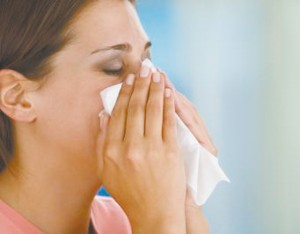By Daniel N. Tucker, M.D. –
 Chronic and recurrent sinusitis is be-coming increasingly common, despite more treatment options. Remedies include antibiotics, topical and systemic steroid therapy (Cortisone), and various anti- allergy and decongestant medications, as well as surgical options. It is not uncommon to see patients who have undergone multiple surgical procedures for this problem. Sinusitis may be associated with a related condition known as nasal polyposis, benign growths that obstruct nasal and sinus passages. In 1983, a report was published in the Journal of Allergy and Clinical Immunology by Katzenstein, et al, titled “Allergic Aspergillis Sinusitis, a Newly Recognized Form of Sinusitis”. Over the past 30 years there has been an increased awareness of fungal involvement in the etiology of many cases of chronic or recurrent sinusitis. Like all new ideas in medicine, there has been significant opposition to this concept.
Chronic and recurrent sinusitis is be-coming increasingly common, despite more treatment options. Remedies include antibiotics, topical and systemic steroid therapy (Cortisone), and various anti- allergy and decongestant medications, as well as surgical options. It is not uncommon to see patients who have undergone multiple surgical procedures for this problem. Sinusitis may be associated with a related condition known as nasal polyposis, benign growths that obstruct nasal and sinus passages. In 1983, a report was published in the Journal of Allergy and Clinical Immunology by Katzenstein, et al, titled “Allergic Aspergillis Sinusitis, a Newly Recognized Form of Sinusitis”. Over the past 30 years there has been an increased awareness of fungal involvement in the etiology of many cases of chronic or recurrent sinusitis. Like all new ideas in medicine, there has been significant opposition to this concept.
Fifteen years ago, Ponikau et al, published a landmark paper in the Mayo Clinic proceedings titled, “The Diagnosis and Incidence of Allergic Fungal Sinusitis”. Of some 101 consecutive surgical cases with chronic rhinosinusitis, 93% were diagnoses as having allergic fungal sinusitis. This was based on both culture results and pathological findings. In this study, cultures for fungi were done in a far more effective manner than is usually available, which included the addition of material to the thick mucus obtained from sinus cavities to liquefy it so that the fungal colonization could be more readily demonstrated. A surprisingly large variety of fungi were recovered. As might be expected, a large number of agents were in certain fungal groups or families, however, a large number of families were represented by one or more recoveries.
Fungi love South Florida. They also love warm, dark, moist areas such as our sinus cavities. Although true sinus fungal infections do occur, in most cases the fungal involvement seems to be more of colonization than a true infection. The fungi do not actually invade tissue in these cases, but live in the mucus where they can elicit both allergic reactions but also generate enzymes which break down complex biological materials into forms that they can assimilate and use for energy and growth. These active enzymes liberated in the sinus cavities and coming in contact with their mucus membranes play a large role in chronic sinusitis in many cases. Many fungi can also produce toxic materials known as mycotoxins which can have both local effects in the sinuses but also can have a systemic effect in affecting our well- being. They also may have a role in suppressing our immune systems. All human beings routinely inhale fungal spores on a daily basis, however problems develop when these spores can flourish in the sinus cavities. Allergic fungal sinusitis should always be suspected when sinuses fail to respond to convention therapy or recur when therapy is discontinued.
Treatment options for allergic fungal sinusitis include topical or systemic corticosteroids (Cortisone – like medications), saline irrigations to flush out as much as possible, and sinus surgery if necessary to correct obstructions, agents to facilitate drainage by thinning out and stimulating mucus production, decongestants to try to open up the small sinus openings or ostea, and in particular the treatment of allergic conditions if these can be identified. Antifungal agents, both topical and systemic may be helpful. Treatment goals are to reduce the allergic response, both to the colonizing fungi and to other agents that are aggravating congestion and interfering with sinus drainage. A combination of methods is usually necessary. Corticosteroids (Cortisone-type agents) often give relief but other measures are necessary if this is to be sustained because of the inherent danger of systemic Cortisone –type agents on a long-term basis.
Identification and treatment of allergens is essential as part of the treatment process. This is particularly true when the likelihood of recurrent surgeries or long-term use of systemic Corticosteroids (Cortisone-like drugs) are the alternatives.
Daniel N. Tucker, M.D.
561-835-0055
1411 North Flagler Drive, Suite 6700 (in Victor Farris Building)
West Palm Beach, Forida 33401
Check Also
RejuvaNATION MedSpa: Elevating Men’s Health to New Heights
Embark on a Journey to Revitalize Your Vitality Rediscover the joy of a spontaneous sex …
 South Florida Health and Wellness Magazine Health and Wellness Articles
South Florida Health and Wellness Magazine Health and Wellness Articles




